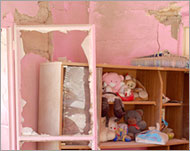Baalbek after the bombs
Baalbek is usually a festive town in August, a place where Arab and world culture is celebrated.

But when Aljazeera visited this week after several days of intense Israeli aerial bombardment, inhabitants of the city were on edge.
The road running through the Bekaa valley, to the east of Beirut, was almost empty and a series of petrol stations on the city’s outskirts had been bombed.
As we parked and walked towards the town’s historic centre a Hezbollah member carrying a handheld radio quickly approached us and politely asked if we “needed help”.
Explaining that we were journalists visiting from Beirut we asked if we could see some of the sites that had been hit in Israeli air strikes.
Baalbek is often referred to as a Hezbollah “stronghold” but the town also has a large Christian population and it normally hosts an international festival in the spectacular Roman ruins that lie in the heart of the city.
Yet Hezbollah are indeed strong here and in the 1980s party members were trained by Iranian revolutionary guards stationed in the town.
Willing guides
Now, after three weeks of war, Hezbollah has seemingly taken the town’s security into their own hands.
 |
|
Image: Christian Henderson |
The man asked us to accompany him to a place where more men with radios took our passports and recorded our names. They apologised for the measures and said they were happy to show us the city.
Our guide said “a tour in the town is no problem but we can’t take you up to see the ‘centres'”, a reference to sensitive Hezbollah sites on a hill above the city.
Around 250 houses and buildings had been destroyed in Israeli air raids and we saw a number of devastated houses, schools, and religious buildings. Many of the institutions were run by charitable organisations that are close to Hezbollah but none of them showed any signs of being of any military use.
Most of what we saw were civilian houses, clearly identifiable by the teddy bears and children’s toys, kitchen utensils and belongings strewn in the debris.
Monitored
We could hear the sound of Israeli drones flying over the town.
Casting a glance up to the sky our guide laughed: “The MKs are taking a photo of you taking a photo of that building.”
|
“In two minutes only, 42 years of work have been finished and everything has been lost” Sala Barake, factory manager |
MKs, as they are known in Arabic, are predator drones used by the Israelis to record the GPS coordinates of targets, although larger versions carry small missiles.
While at another bomb sight our guide received a report on his radio that Israeli F-16s were nearing the city.
He said: “You should go now. It’s not safe.”
Leaving the town we stopped at the liban lait milk factory which had been destroyed by the Israelis in an attack two weeks earlier.
A plume of smoke was still rising between the mangled metal. Swarms of flies had been attracted to the pools of rotting milk.
Factory target
The Bekaa has sometimes been called the “hidden front” in this war and more than 100 civilians from this agricultural region have been killed in Israeli air strikes.
At least five factories in the area have been destroyed resulting in the loss of around 1,500 jobs. The main border crossing between Lebanon and Syria is now closed following repeated attacks and the main road between Beirut and Damascus is deserted.
 |
|
Baalbek is usually known for its |
Further south of Baalbek, we reach the outskirts of the town of Chatura and are met by the remains of the second biggest glass factory in the Middle East.
Salah Barake, one of the managers of the plant, took us up onto part of the roof that remained standing so we could look directly into the wreckage.
Lunch break
Huge craters had been left by the five or six missiles that had ploughed through the metal, glass and machinery. The factory was Indian owned and two Indian workers were killed in the attack.
Barake said: “It’s a miracle more people were not killed. It was just luck that most of them were having lunch when the Israelis hit.
 |
|
The factory was hit two weeks |
“I don’t know why they hit this factory. It was a good clean business. It had nothing to do with either Muslims or Christians. In two minutes only, 42 years of work have been finished and everything has been lost.”
As the afternoon gets late we decide to leave. Climbing back up the mountain road that leads to Beirut we pass bombed out trucks the Israelis believed were carrying arms to Hezbollah.
Driving a lorry is now a risky business and in a futile attempt to avoid being targeted drivers have attached white flags or the banners of big multinational corporations to their vehicles.
When we reach Beirut later that evening we hear the news that an Israeli commando unit raided Baalbek abducting six and killing 11.
Clearly the town’s state of unease was justified.